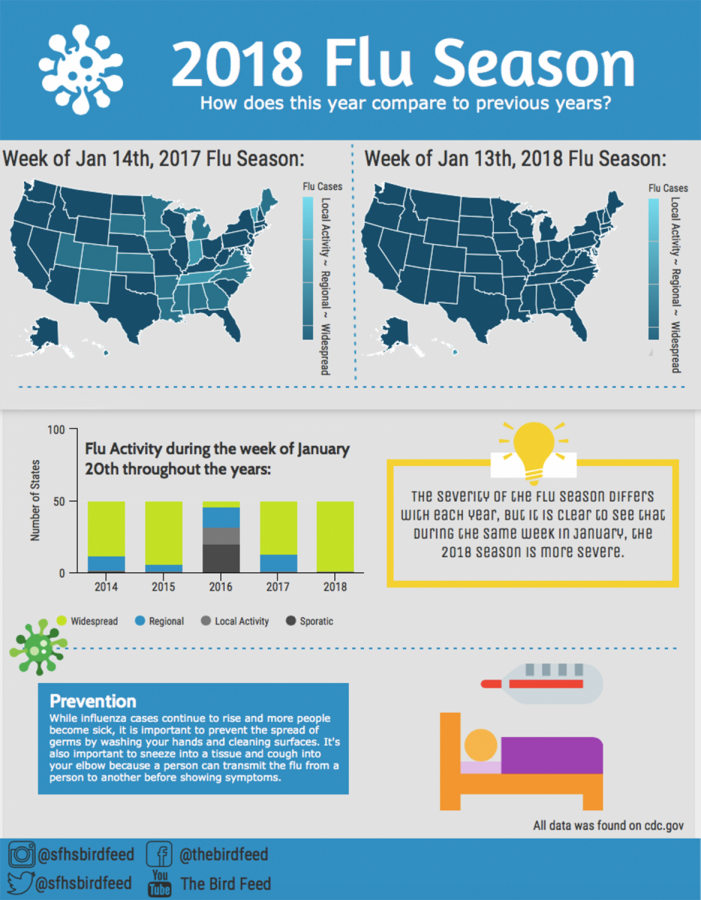Reaching the peak of the 2018 flu season
Data and statistics from this year’s flu season proves that the 2017-2018 season of the flu is more widespread than the 2016-2017 flu season. Even the flu season from several years ago were not as active as this year. All data was found on the Center for Disease Control and Prevention (CDC) website.
January 30, 2018
As the flu season continues, the number of cases are increasing dramatically week after week. Although the season begins in October, flu activity peaks during January or February. The country is experiencing a particularly bad flu season, and the number of deaths and hospitalizations are on the rise. The United States is struggling with this illness and CNN stated that as of January 13, 30 children nationwide have died because of this illness.
According to Savannah Now online newspaper, in Georgia alone, there have been a total of 25 deaths due to the flu this season. Of the lives influenza has claimed this season, one of those was a man from Forsyth County. A 64-year-old man died earlier this month due to the flu, and thus far, he is the only casualty from Forsyth County. “There were 40 hospitalizations in metro Atlanta due to the influenza infection during the week of Jan. 7 through Jan. 13,” the state Department of Public Health said. So far this season, area facilities have seen 404 hospitalizations due to flu. Forsyth County News announced that the number of flu cases has more than doubled since the previous year.
It is clear that this flu season is worse than usual, but the question is why? This year’s season involves a strain of influenza that is more difficult to prevent. The flu virus we are seeing today is H3N2, and Vox news site explains that there are four types of influenza, labeled A through D, and the seasonal flu involves viruses A and B. “Every year, different strains of these viruses circulate. The reason this year’s flu season is more severe than usual is because it involves the dreaded H3N2, a strain of the influenza A virus that causes more health complications and is more difficult to prevent.”
Because the nation is experiencing the H3N2 strain, it is difficult to prevent with the current flu vaccine. Despite these complications, it is still recommended that you receive a flu shot in order to limit your chances of becoming infected. In addition to getting a flu shot, it is encouraged that people reduce the spread of germs by washing their hands often, disinfecting frequently touched surfaces, coughing into one’s sleeve and sneezing into one’s tissue. The CDC website states, “The flu is a contagious respiratory illness caused by influenza viruses that infect the nose, throat, and sometimes the lungs.” A person who contracts influenza can spread the virus before they are aware that they are sick, which is why preventing the spread of germs is so important.
#Flu activity continues to increase nationally in the United States. CDC recommends flu vaccination, even if you've already been sick, and early antiviral treatment for people who are very ill OR those who have flu and are at high risk of complications. https://t.co/KHXucF48vi pic.twitter.com/7oJK4qbUp8
— CDC (@CDCgov) January 26, 2018
The CDC website later mentioned the symptoms of the flu. Some of those symptoms include: “Fever or feeling feverish/chills, cough, sore throat, runny or stuffy nose, muscle or body aches, headaches, fatigue, some people may have vomiting and diarrhea.” If a person begins to experience these symptoms, it is recommended that they talk to their doctor or a medical professional. The flu is treated with antiviral drugs and substantial rest. It is also important to stay hydrated. It is crucial that a person with the flu stays home in order to prevent the spread of the illness.
The people at the highest risk for contracting the flu are young children and the elderly. These same groups of people are also most likely to develop flu-related complications. The CDC stated, “Complications of flu can include bacterial pneumonia, ear infections, sinus infections, and worsening of chronic medical conditions, such as congestive heart failure, asthma, or diabetes.” These issues can be deadly.
As the flu season reaches its peak, it is essential that people stay mindful and safe during the upcoming months.









